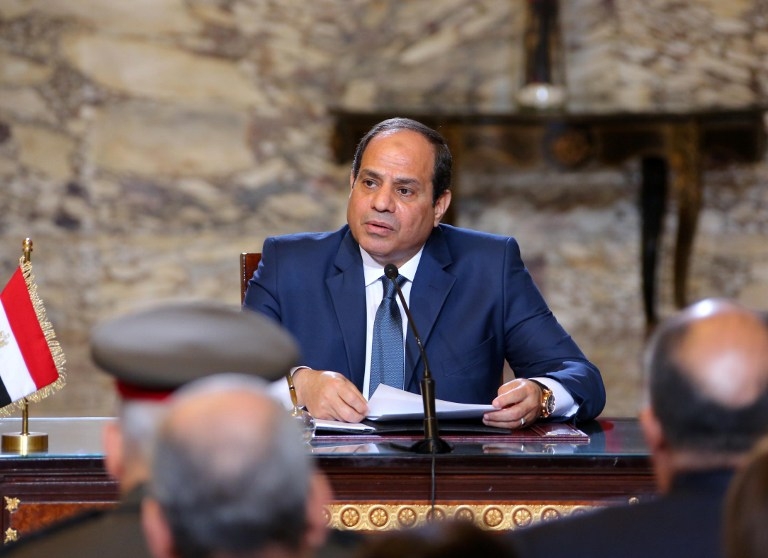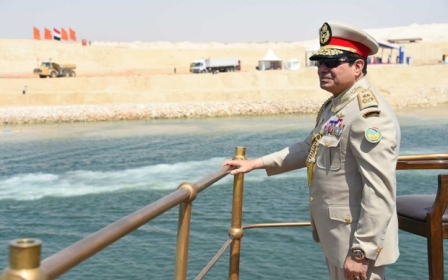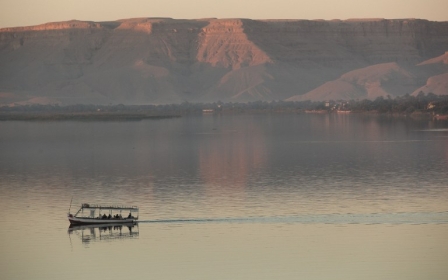Sisi urges women to use less water and electricity to ease economic crisis

Egyptian President Abdel Fattah al-Sisi said on Saturday he would not shy from tough economic reforms he said previous rulers had avoided because they feared unrest, and urged Egyptian women in particular to cut back on their use of water and electricity.
Sisi's comments came after an initial agreement with the International Monetary Fund for $12 billion in financing that hinges on a reform package slashing state spending and the devaluation of the Egyptian pound.
Parliament is also expected to pass a law introducing a value added tax to raise state revenues.
Egypt's economy has been battered by turmoil since a 2011 uprising ousted former president Hosni Mubarak, ushering in unrest that has driven away tourists and foreign investments.
"The first attempt at real reform was in 1977," Sisi said in a speech aired by state television during the launch of an ethynyl plant in the coastal city of Alexandria.
The country had been rocked by riots that year after president Anwar Sadat said he would end basic subsidies as demanded by the World Bank in return for a loan.
"The people's reaction caused the state to backtrack, and it has continued to delay [the reforms] till now," said Sisi.
"All the hard decisions that many over the years were scared to take: I will not hesitate for a second to take them," he said.
Sisi took aim at the country's bloated bureaucracy, saying the state had hired hundreds of thousands of people who were not needed.
"When I appoint 900,000 people in the public sector because of pressure for jobs, at a time when I really don't need anything from them... what effect will this have?"
Paying their salaries, Sisi added, had increased state debts.
"We borrow and we borrow and we borrow, and the more we borrow the more the debt grows," he said.
The government has already partially cut fuel and electricity subsidies, but the gradual reforms have been limited so far.
"We are trying to bridge the gap between resources and spending," Sisi said.
He called on Egyptians, especially "the great Egyptian lady," to use less electricity and water.
"Please... she can - with her presence in society and the family - decrease a lot the consumption of water and electricity, and other things that are a burden on the economy."
Although growth increased under Mubarak, economic disparity fuelled the 2011 uprising that ended his three-decade rule.
He was succeeded in 2012 by Mohamed Morsi, Egypt's first democratically elected president, whose government negotiated for an IMF loan but avoided austerity measures that could provoke unrest.
Sisi, a former army chief, led the military coup against Morsi in 2013, winning elections a year later.
Morsi's overthrow unleashed a brutal police crackdown on his Muslim Brotherhood support base, while attacks by Islamic militants have further driven tourists away and severely reduced a major source of foreign currency income.
In October 2015, the Islamic State (IS) group's Egypt affiliate announced it had downed a Russian passenger plane carrying holidaymakers over the Sinai Peninsula, killing all 224 people on board.
The attack prompted Russia to cancel flights to Egypt, and Britain to stop flights to the Sharm el-Sheikh resort airport in Sinai, where the bomb was planted on the Russian plane.
Middle East Eye propose une couverture et une analyse indépendantes et incomparables du Moyen-Orient, de l’Afrique du Nord et d’autres régions du monde. Pour en savoir plus sur la reprise de ce contenu et les frais qui s’appliquent, veuillez remplir ce formulaire [en anglais]. Pour en savoir plus sur MEE, cliquez ici [en anglais].




